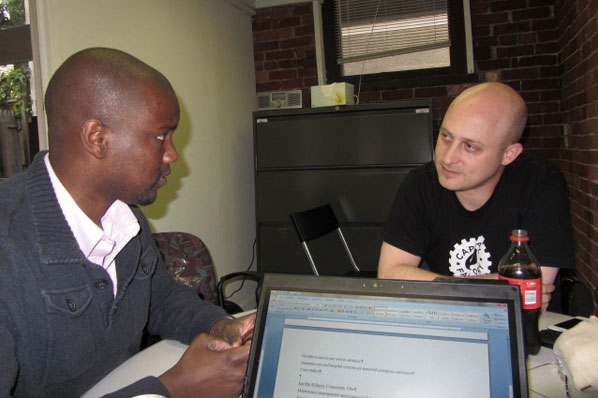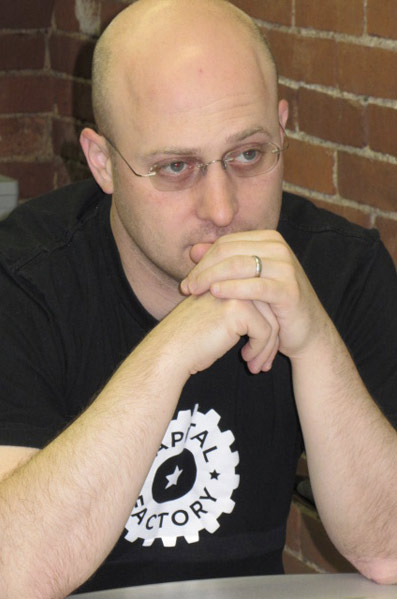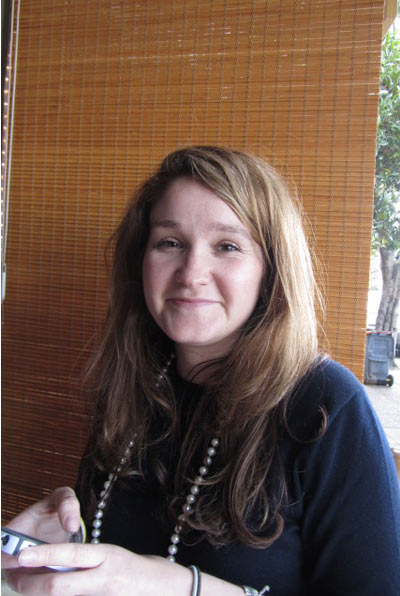Editor's note: This story first appeared here on sister site Pop City.
Carnegie Mellon is a hotbed of innovation and entrepreneurship. Here, students and faculty are inspired to create technologies that will change the world. From dorm rooms to laboratories, from business to computer science, from undergrads to senior faculty, CMU stimulates innovation and incubates first-time entrepreneurs.
Walking through campus, one witnesses the buzz of creation as clusters of students brainstorm in science labs, around whiteboards, hover over computers during lunch, or race to their next class. One sees faculty deep in discussion with each other, with students. What are they talking about? Could they be on the brink of the next big thing? Wouldn’t you like a front row seat to the creation of these businesses?
Last week, I had the privilege of luring back to campus a seasoned entrepreneur alum (computer science, 1999) who had been my student 13 years ago: Joshua Baer, four-time entrepreneur, three successful exits, more than 50 private equity investments in startups, and Austinpreneur. Josh came back to CMU to give back, literally. Over the course of several days, he saw 30 pitches of projects from current students, alumni-based startups in the region, and faculty projects that we hope to turn into startups.
Josh’s visit to campus gave me a good excuse to line up the best and the brightest so he could see what’s new at CMU. Here’s a sample of what he saw:
A software system to manage all the disparate information inherent in large buildings. The technology is being developed by Burcu Akinci, a professor/researcher in civil and environmental engineering, along with a promising PhD student, Xuesong (Pine) Liu.
A startup by serial Pittsburgh entrepreneur, Rick Cancelliere, and Matt Stadler, a PhD alum in chemistry. The duo have teamed up to create Treatspace, which finds and corrects online facts about doctors. Their pitch includes data that incorrect online information affects 100% of physicians.
A new craft beer brewing facility by two undergrads, Matt Katase and Asa Foster who are bucking the trend of doing a tech startup. The pair are barely of drinking age but they are nuts about craft beer and believe that with their skills and passion they can brew and sell beer that appeals to their generation. With recipes for beers like white chai ale, The Brew Gentlemen make a strong business case that Pittsburgh is a fantastic opportunity to do this.
ComVibe, founded by Tepper alum, Kariithi Kilemi, sells software to property managers that reduces tenant turnover, accelerates tenant acquisition, and increases the lifetime value of a tenant. ComVibe has received funding and support from Idea Foundry and AlphaLab, and is growing fast with pilot projects at several large property managers.
Resunate, another alumni company, co-founded by Ayan Kishore, who graduated with a masters from Human Computer Interaction Institute, and Mona Abdel-Halim, who graduated with an MBA from Tepper and a masters in public policy from Heinz. Also an AlphaLab company, Resunate has developed software for resumes that echoes the online dating world by telling the job seeker how their resume will score in an applicant tracking system. Resunate allows the job seeker to optimize their resume for computer-generating algorithms so they can get through the online system of an employer.
Anthony Palma, finishing up his masters from the Entertainment Technology Center, and his project – a game development studio, Kermdinger Studios, which focuses on online comedy games. Anthony spent the last year developing his idea in the non-classroom but highly creative environment that the ETC provides.
Shoefitr, founded by three engineering alums, including Matt Wilkinson. The company has been through AlphaLab and raised some decent seed financing. Shoefitr also has revenues, and Matt was looking a little bleary eyed as he talked, having just got off the plane from one of the fastest growing countries in the world where he inked a deal with a large online shoe retailer. Shoefitr has very cool technology that uses a 3-D image of a foot plus information about current shoes to tell the shoe buyer what shoes and brands will fit best. This solves the huge problem of returns faced by online stores.
Enes Hosgor, using his PhD research in engineering, to create EEMe, a software platform that helps the energy efficiency industry gain needed information about the homes that can benefit the most from energy efficient renovations. Partnering with local energy efficiency expert, Tim Carryer, and his company, GreenoverGreen, and the collection of regional energy auditors that comprise DEAWP (Diagnostic Energy Auditors of Western PA), Enes is on the way to pilot test his system in the field.
Saving the hottest for last, Josh concurs that post-doc Sophie Lebrecht has the largest opportunity even if she is the earliest stage. Sophie has developed technology that can predict consumer preference based on visual images. Her project, NeonLabs, is currently funded under the new Innovation-Corps program by the NSF. Sophie and her team (which includes Mike Tarr from the Center for the Neural Basis of Cognition, and me as mentor) is currently exploring how to apply her technology to the world of online videos and the thumbnail images that provide the gateway to the video and to the advertisement, which is often the revenue model for the video company.
BABS CARRYER is an entrepreneur, New Venturist blogger, entrepreneur (LaunchCyte), and involved in entrepreneurship @ CMU (Project Olympus, Don Jones Center for Entrepreneurship, Institute for Social Innovation)
PHOTOS
Josh Baer
Sophie Lebrecht
Karithi Kilemi
Josh Baer



